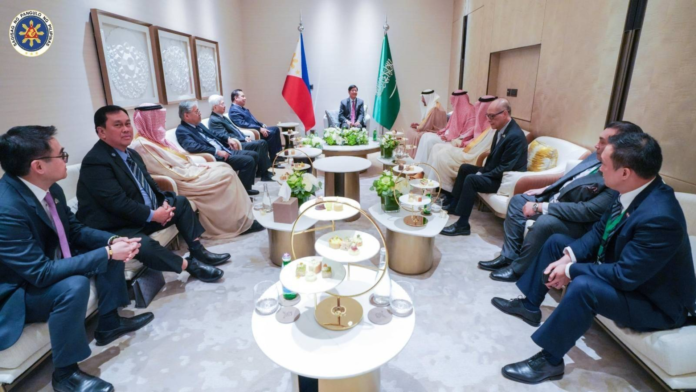With President Ferdinand R. Marcos Jr.’s continued pitch for the Maharlika Investment Fund (MIF), Speaker Martin Romualdez on Friday said several Saudi Arabian business leaders are keen on investing in the country’s newly created sovereign wealth fund.
Citing the roundtable meeting between Saudi Arabia’s business leaders and the President at the St. Regis Hotel in Riyadh, Kingdom of Saudi Arabia, Romualdez expressed confidence that the business leaders would accept Marcos’ invitation to invest in the MIF.
“This invitation represents an exciting opportunity for our nation, and I believe it will receive a positive response from the Saudi business community,” Romualdez said. “It aligns perfectly with our vision of fostering international partnerships and diversifying our sources of investment for the benefit of our people.”
Among the Saudi firms represented during the roundtable meeting were Public Investment Fund (PIF), Hassana Investment Company (HIC), Saudi Arabian Investment Company (Sanabil), and the Saudi Fund for Development (SFD).
Romualdez noted that during the roundtable discussion, Mulhan Albakree, Executive General Manager of PIF, expressed his interest in the MIF.
The Kingdom’s PIF is the 6th largest sovereign wealth fund (SWF) in the world, with assets worth USD607.42 billion.
It currently owns 71 companies in 10 different sectors and has created more than 500,00 direct and indirect jobs.
Sanabil, formed by the Saudi government in 2009 and taken over by PIF, invests about USD2 billion per year in venture, growth capital and small buyouts.
Bandar Al Hamali, the CEO of Jada, one of Saudi Arabia’s biggest investment companies, also expressed interest in the MIF, Romualdez said.
He said the Philippines has an “immense potential” to become a haven for foreign investments due to the country’s robust and dynamic economy, young and skilled workforce, and strategic geographical location that offers access to growing markets in the Asia-Pacific region.
He pointed out that Saudi investors may be interested in funding flagship infrastructure projects in Mindanao, especially those that would benefit the Bangsamoro Autonomous Region in Muslim Mindanao (BARMM).
He particularly cited the PHP10.19-billion hydromechanical and electro-mechanical rehabilitation of the Agus IV, V, VI, VII hydroelectric power plants in Lanao del Norte to restore their respective rated capacities.
The Agus hydroelectric plant rehabilitation, with a total rated capacity of 471 megawatts, is envisioned as a Public-Private Partnership (PPP) project.
Romualdez said Saudi investors may also be interested in participating in the Mindanao Railway Project, also through PPP.
A PHP100-million feasibility study of the Mindanao Project Phase 3 is expected to start within the year, according to Department of Transportation officials.
Transparency, accountability
Romualdez, meanwhile, welcomed President Marcos’ announcement that the implementation of the MIF will push through before the year ends.
He said the President’s efforts to improve the MIF’s organization demonstrate the administration’s commitment to transparency, accountability, and responsible fiscal management of the fund.
“While we embrace the potential of this endeavor, we must ensure that the MIF and investments into it adhere to stringent regulations, safeguarding our national interests, and aligning with our commitment to good governance,” he said.
Romualdez said the potential benefits of this partnership with Saudi Arabian business interests are substantial and include economic growth, job creation, and infrastructure development.
“We look forward to working closely with our international partners to turn this vision into reality,” he said.
Finance Secretary Benjamin Diokno said the MIF is to quicken the implementation of the country’s USD153 billion worth of infrastructure projects, to upgrade physical and digital connectivity in the transportation, agriculture, health, and energy sectors, as well as in climate resilience. (PNA)
Photo credit: Facebook/opgovph


